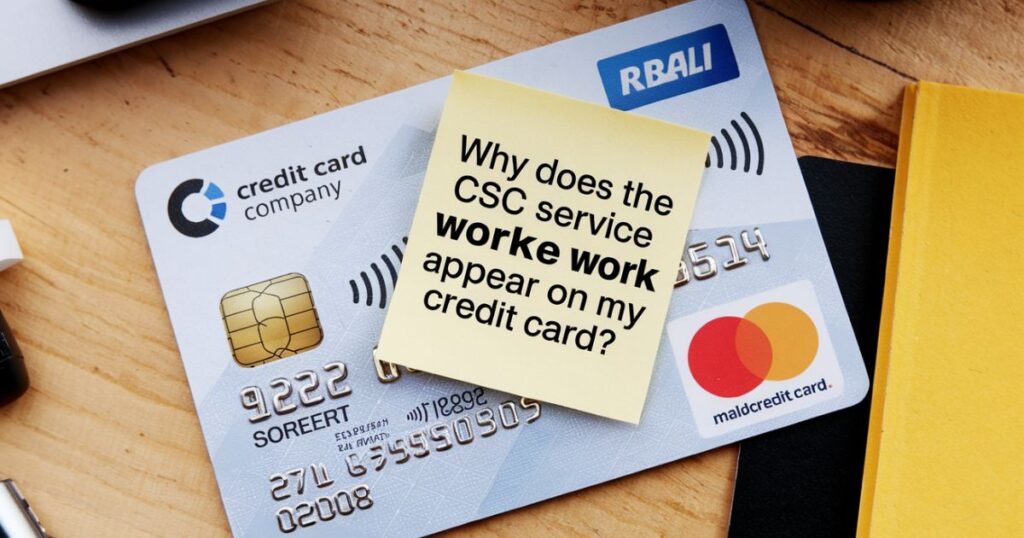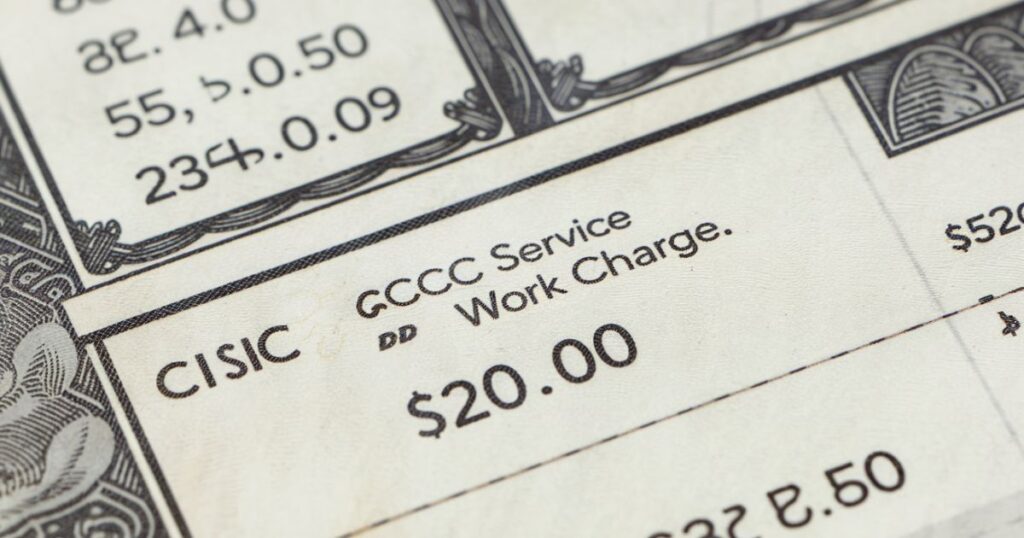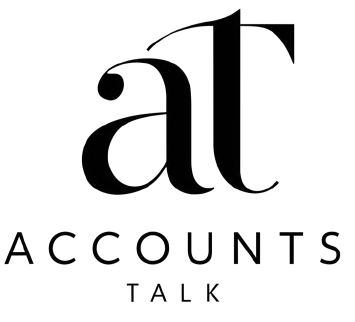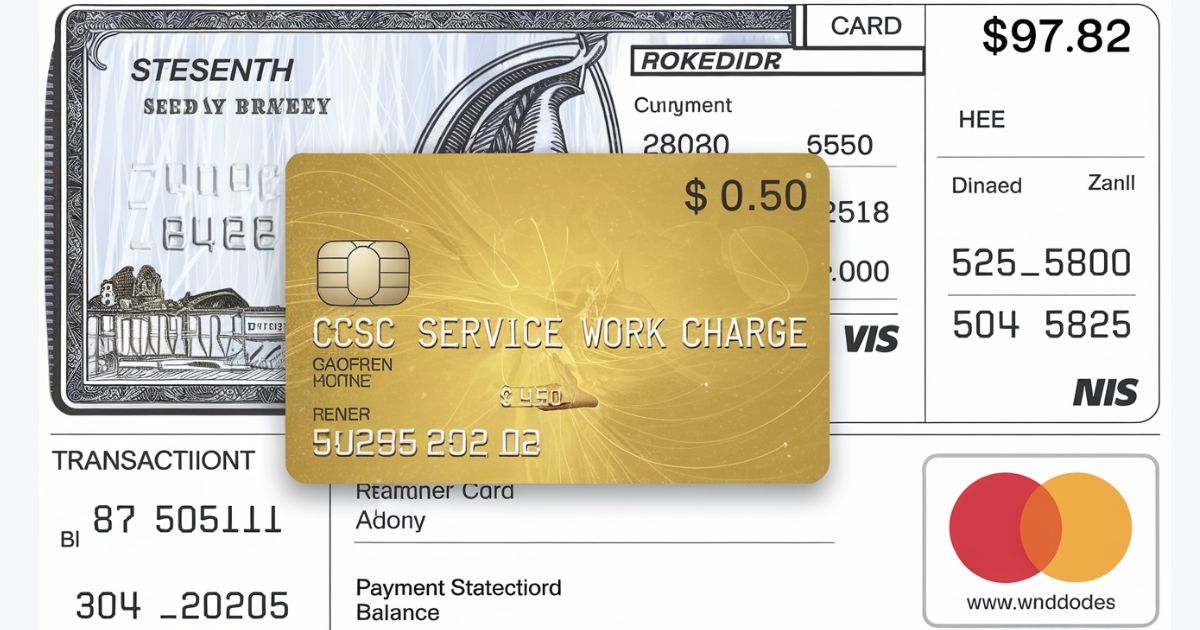The CSC service work charge is a fee that sometimes appears on credit card or bank statements, often causing confusion for account holders. This charge is typically associated with services provided by Computer Sciences Corporation (CSC), a multinational IT services company.
Understanding the nature of this charge, its legitimacy, and what it represents is important for consumers who encounter it on their financial statements.
What is the CSC Service Work Charge on a credit card?
The CSC Service Work Charge on a credit card statement typically refers to a fee associated with services provided by Computer Sciences Corporation (CSC), now known as DXC Technology after a merger in 2017. This charge can appear for various reasons:
- IT Services: CSC/DXC provides IT services to many businesses, including financial institutions. If your credit card issuer uses their services, you might see this charge for system maintenance or upgrades.
- Credit Monitoring: Some credit card companies offer credit monitoring services through CSC/DXC, which may appear as a CSC charge on your statement.
- Identity Protection: CSC/DXC also offers identity protection services, which could be bundled with your credit card as an additional feature.
- Third-Party Billing: In some cases, CSC/DXC acts as a billing intermediary for other services you may have subscribed to through your credit card.
- Fraud Prevention: The charge might be related to fraud detection and prevention services provided by CSC/DXC to your credit card issuer.
It’s important to note that while this charge is often legitimate, it can sometimes be unexpected or unclear to cardholders. If you see a CSC Service Work Charge on your statement and don’t recognize it, it’s advisable to contact your credit card issuer for clarification. They can provide specific information about the nature of the charge and whether it’s a service you’ve agreed to.
Why does the CSC Service Work Charge appear on my credit card?

The CSC Service Work Charge can appear on your credit card statement for several reasons:
- Subscribed Services: You may have enrolled in services provided by Computer Sciences Corporation (CSC) or DXC Technology (following their merger). These often include:
- Identity theft protection
- Credit monitoring
- Fraud alert services
- Bank-Provided Services: Your credit card issuer might utilize CSC/DXC’s services and pass the cost to cardholders. This could cover:
- IT infrastructure maintenance
- Security system upgrades
- Data management services
- Third-Party Billing: CSC/DXC sometimes acts as a payment processor for other companies. The charge you see might be for a different service, but CSC/DXC handles the transaction.
- Fraud Prevention: Many financial institutions employ CSC/DXC’s advanced fraud detection systems. This charge may reflect the cost of these protective measures implemented to safeguard your account.
- Account Management: CSC/DXC offers various account management solutions to banks and credit card companies. The charge could be related to these backend services.
- Automatic Renewals: If you’ve previously signed up for a CSC/DXC service, it may have auto-renewed, causing the charge to reappear on your statement.
- Bundled Services: Some credit cards include additional services as part of their offering, which may be provided by CSC/DXC and shown as a separate line item.
- System Upgrades: Occasionally, credit card companies undertake major system upgrades or transitions, which might involve CSC/DXC’s services and result in a temporary charge.
- Regulatory Compliance: CSC/DXC may provide services that help your credit card issuer comply with financial regulations, and the cost might be passed on to cardholders.
It’s important to note that while these charges are typically legitimate, they can sometimes appear without clear prior notification. If you’re uncertain about a CSC Service Work Charge on your statement, the best course of action is to contact your credit card issuer directly. They can provide specific information about:
- The exact nature of the charge
- Its purpose and duration
- Whether it’s a service you’ve agreed to as part of your cardholder agreement
- Options to opt-out if it’s a service you don’t want
Remember, you have the right to question any unfamiliar charges on your credit card statement, and your issuer is obligated to provide clear explanations.
CSC Service Works Charge on Credit Card – Contact Details
If you’ve encountered a CSC Service Works charge on your credit card and need to contact someone for clarification or resolution, here are the steps you can take and the relevant contact details:
- Credit Card Issuer:
- Your first point of contact should be your credit card issuer.
- Look for the customer service number on the back of your credit card.
- Alternatively, log into your online banking portal and look for a ‘Contact Us’ section.
- CSC/DXC Technology:
- If directed by your card issuer, you may need to contact CSC (now DXC Technology) directly.
- Main website: www.dxc.com
- General Contact: 1-877-651-6193 (US toll-free)
- For specific services, you may be directed to different numbers or email addresses.
- Consumer Financial Protection Bureau (CFPB):
- If you’re unable to resolve the issue with your card issuer or CSC/DXC:
- Website: www.consumerfinance.gov
- Phone: 1-855-411-2372
- Federal Trade Commission (FTC):
- For reporting potential fraudulent charges:
- Website: www.ftccomplaintassistant.gov
- Phone: 1-877-FTC-HELP (1-877-382-4357)
- Your State’s Attorney General’s Office:
- For state-specific consumer protection issues.
- Contact information varies by state.
When contacting about the charge:
- Have your credit card statement ready.
- Note the exact date and amount of the charge.
- Be prepared to verify your identity.
- Ask for a detailed explanation of the charge.
- Inquire about options to dispute or remove the charge if unauthorized.
- Request information on how to opt-out of the service if desired.
Remember:
- Be persistent but polite in your inquiries.
- Keep records of all communications, including dates, names, and reference numbers.
- If promised a refund or charge removal, ask for written confirmation.
It’s important to act promptly if you notice unfamiliar charges. Most credit card companies have time limits for disputing charges, typically 60-90 days from the statement date.
Would you like more information on how to effectively communicate with financial institutions or tips for protecting your credit card from unauthorized charges?
How to stop/reduce CSC Service Work Charge
If you want to stop or reduce the CSC Service Work Charge on your credit card, follow these steps:
- Understand the Charge:
- Review your credit card statement to identify the exact amount and frequency of the charge.
- Check if it’s a one-time fee or a recurring charge.
- Contact Your Credit Card Issuer:
- Call the customer service number on the back of your card.
- Explain that you want to stop or reduce the CSC Service Work Charge.
- Ask for a detailed explanation of what the charge covers.
- Request to Opt-Out:
- If the charge is for an optional service, request to opt-out.
- Be clear that you no longer wish to receive or pay for this service.
- Ask about any consequences of opting out (e.g., loss of certain protections).
- Negotiate a Reduction:
- If the service is valuable but costly, try negotiating a lower fee.
- Inquire about different service tiers or packages that might be more affordable.
- Check for Alternatives:
- Ask if there are alternative services that provide similar benefits at a lower cost.
- Compare the CSC service with other options available in the market.
- Review Your Cardholder Agreement:
- Some charges may be part of your card’s terms. Review your agreement to understand your rights.
- If the charge wasn’t clearly disclosed, mention this to your card issuer.
- Request a Refund:
- If you were unknowingly charged, request a refund for past charges.
- Be prepared to explain why you believe the charges were unauthorized or unclear.
- Consider Changing Cards:
- If the issuer is unwilling to remove the charge, consider switching to a different credit card that doesn’t include this fee.
- Document Everything:
- Keep records of all conversations, including dates, representative names, and promised actions.
- Follow up any verbal agreements with written confirmation.
- File a Complaint if Necessary:
- If you’re unable to resolve the issue, consider filing a complaint with the Consumer Financial Protection Bureau (CFPB) or your state’s Attorney General’s office.
- Monitor Your Statement:
- After requesting cancellation, check your next few statements to ensure the charge doesn’t reappear.
- Be Cautious of Future Sign-Ups:
- Pay attention when signing up for new services or credit cards to avoid unwanted charges in the future.
Remember, while some CSC Service Work Charges may be optional and can be cancelled, others might be integral to your credit card’s services. In such cases, your options might be limited to negotiating a reduction or changing to a different card product.
How does CSC Service Work Charge appear on bank statements?

The appearance of a CSC Service Work Charge on bank statements often puzzles account holders, leading to questions about its origin and legitimacy. This charge is typically associated with Computer Sciences Corporation (CSC), now part of DXC Technology, a global IT services provider. On bank statements, it can manifest in various ways, reflecting different services or processes related to your account or financial institution’s operations.
The charge may appear under several possible labels, such as “CSC Service Work,” “CSCService Work,” or sometimes with additional descriptors like “CSCService Work – Credit Monitoring.” The exact wording can vary depending on your bank’s coding system and the specific service provided. These charges are usually legitimate and related to services either directly utilized by the account holder or implemented by the bank for account management, security, or compliance purposes.
Understanding how this charge appears is crucial for effective financial management and identifying any potential discrepancies or unauthorized charges. The amount can vary, typically ranging from a few dollars to more substantial sums, depending on the nature of the service. It may show up as a one-time charge or a recurring monthly fee.
In the following sections, we’ll delve deeper into the specifics of how these charges are presented, what they typically represent, and how to interpret them accurately on your bank statement. This information will help you better navigate your financial records and make informed decisions about the services associated with your bank account.
How to prevent CSC Service Work Charge
Preventing CSC Service Work Charges requires a proactive approach and understanding of your banking services. Here are several strategies to help you avoid or minimize these charges:
- Review Your Account Terms:
- Carefully read your bank account or credit card agreement.
- Look for mentions of additional services or fees related to CSC or similar providers.
- Understand which services are mandatory and which are optional.
- Opt-Out of Optional Services:
- Contact your bank or card issuer to identify any optional CSC services.
- Request to opt-out of these services if you don’t need them.
- Be specific about which services you want to cancel.
- Choose Accounts Without These Charges:
- When opening a new account, ask about CSC-related services and charges.
- Compare different account types and choose ones without these fees.
- Consider switching to a bank that doesn’t use CSC services if the charges are a concern.
- Regular Statement Reviews:
- Monitor your statements monthly for any new or unexpected charges.
- Act quickly if you spot a CSC charge you didn’t authorize.
- Avoid Automatic Enrollments:
- Be cautious when accepting new services or upgrades to your account.
- Ask specifically if new features come with additional charges.
- Opt-out of automatic enrollments in new services when possible.
- Utilize Free Alternatives:
- For services like credit monitoring, consider free alternatives (e.g., annual free credit reports).
- Use your bank’s standard security features instead of paying for additional ones.
- Negotiate with Your Bank:
- If charges are mandatory, try negotiating to have them waived or reduced.
- Leverage your customer loyalty or consider bundling services for better rates.
- Set Up Alerts:
- Configure account alerts for any new charges or when your balance drops below a certain threshold.
- This can help you catch and address new charges quickly.
- Understand Your Rights:
- Familiarize yourself with banking regulations regarding fee disclosures and service charges.
- Know that banks must provide clear information about all fees associated with your account.
- Regular Service Audits:
- Periodically review all services linked to your account.
- Cancel any services you no longer need or use.
- Be Cautious with Third-Party Services:
- If you sign up for services through your bank, verify if they’re provided by third parties like CSC.
- Understand the terms and cancellation policies for these services.
- Educate Yourself:
- Stay informed about common banking fees and industry practices.
- This knowledge can help you make informed decisions and spot unnecessary charges.
Remember, while some CSC charges may be preventable, others might be integral to your account’s functionality or security. Always balance the cost of these services against their potential benefits to your financial security and convenience.
Conclusion
Understanding and managing CSC Service Work Charges is an important aspect of responsible financial management. These charges, while often legitimate, can be confusing and sometimes unexpected for many account holders. By familiarizing yourself with why these charges appear, how they’re presented on your statements, and the steps you can take to address or prevent them, you’re empowering yourself to make informed decisions about your banking services.
Key takeaways from this article include:
- CSC Service Work Charges are typically associated with services provided by Computer Sciences Corporation (now part of DXC Technology) to financial institutions.
- These charges can cover a range of services from fraud prevention to credit monitoring, and may be either optional or integral to your account’s features.
- It’s crucial to regularly review your bank statements and understand the terms of your account agreement.
- If you encounter unexpected charges, don’t hesitate to contact your bank or card issuer for clarification.
- There are several strategies to prevent or reduce these charges, including opting out of optional services and choosing accounts that don’t include them.
- Stay proactive in managing your accounts and be cautious about automatically enrolling in new services.
Remember, while some fees are unavoidable, many can be managed or eliminated with the right approach. By staying informed and actively engaging with your financial institution, you can ensure that you’re only paying for services that provide value to you.
Ultimately, the goal is to strike a balance between utilizing beneficial services that enhance your financial security and avoiding unnecessary costs. With the knowledge gained from this article, you’re better equipped to navigate the complexities of modern banking and make choices that align with your financial goals.
More Post:

Mia Hazel is a finance expert and the author behind insightful content that simplifies complex financial concepts. With a passion for empowering readers to make informed financial decisions, Mia breaks down everything from budgeting to investments with clarity and precision.
Her work is dedicated to helping individuals navigate the financial world with confidence and achieve their financial goals. Follow her for practical tips and advice on all things finance.

